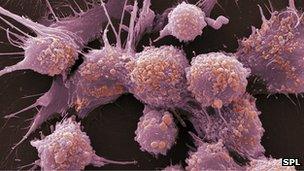Prostate drug abiraterone 'set for NHS use'
- Published

Abiraterone has been shown to extend life for more than three months
A drug for advanced prostate cancer is likely to be approved for NHS use in England and Wales after the medical watchdog reversed an earlier decision.
Abiraterone, which costs about £3,000 a month and can extend life by more than three months, was initially rejected by NICE for not being cost effective.
The decision prompted an angry response from patients and cancer charities.
Final approval will be made in June after the manufacturer offered the oral tablet at an undisclosed lower price.
'Wonderful news'
Prostate cancer is the most common cancer in men. Once it spreads it cannot be cured - about 10,000 men die every year from the cancer in the UK.
Abiraterone is one of the few treatments available to prolong life in patients with advanced prostate cancer but, in February 2012, NICE (the National Institute for Health and Clinical Excellence) said it was not cost-effective.
<link> <caption>The latest draft guidelines by NICE</caption> <url href="http://guidance.nice.org.uk/TA/Wave26/4" platform="highweb"/> </link> reverse that stance.
Chief executive Sir Andrew Dillon said he was "very pleased" with the decision.
He explained the change of heart: "During the consultation on the draft guidance Janssen, the manufacturer of the drug, submitted further information for the committee to consider.
"This included a revised patient access scheme which involves providing the drug to the NHS at a discounted price; further information on which patients would benefit most and clarification on how many patients could receive the drug."
Janssen said it had gone to "significant lengths" to find a solution, although the scale of the discount has not been made public.
Owen Sharp, the head of the The Prostate Cancer Charity, said: "This announcement represents a resounding triumph for each of the thousands of men with advanced prostate cancer in England and Wales who know just how much the prospect of precious extra time with their loved ones really means.
"We are delighted that NICE has overturned its earlier decision after reviewing the evidence. We are also pleased that the manufacturer responded to our call to deliver a further reduction in price.
Cancer Research UK helped in the early stages of development of the drug and gets royalties when it is sold.
Dr Harpal Kumar, the charity's chief executive, said: "This is wonderful news for patients with advanced prostate cancer and, in part, this U-turn is down to the public's disappointment at the initial refusal.
"People's donations have allowed Cancer Research UK to fund the discovery and early development of abiraterone - now they've also helped to ensure prostate cancer patients get access to this important treatment by making their voices heard."
He said the government needed to get "exceptional" drugs to patients sooner and called on the pharmaceutical industry to "price in a realistic way".
'Thrilled'
If NICE approves the drug in June, it will have to be offered by the NHS in England and Wales.
At the moment, NHS patients in England can access the drug through the Cancer Drugs Fund, a pot of money which pays for unapproved cancer drugs.
Earlier this year the Scottish Medicines Consortium said the cost of the drug did not justify the health benefits, but it is still in discussions with the manufacturers.
The Welsh government has already made a decision to fund the drug. A decision will be made in Northern Ireland after the final recommendation is made by NICE.
Prof Johann de Bono, who led the trials of abiraterone at The Institute of Cancer Research and The Royal Marsden NHS Foundation Trust, said: "I'm thrilled that this drug will now be routinely available for eligible patients on the NHS.
"Abiraterone acetate is one of only a handful of life-extending drugs for these patients and, importantly, it can also improve quality of life.
"Some of my patients have been taking abiraterone for several years through a clinical trial and are still pain free."
- Published2 February 2012
- Published20 February 2012